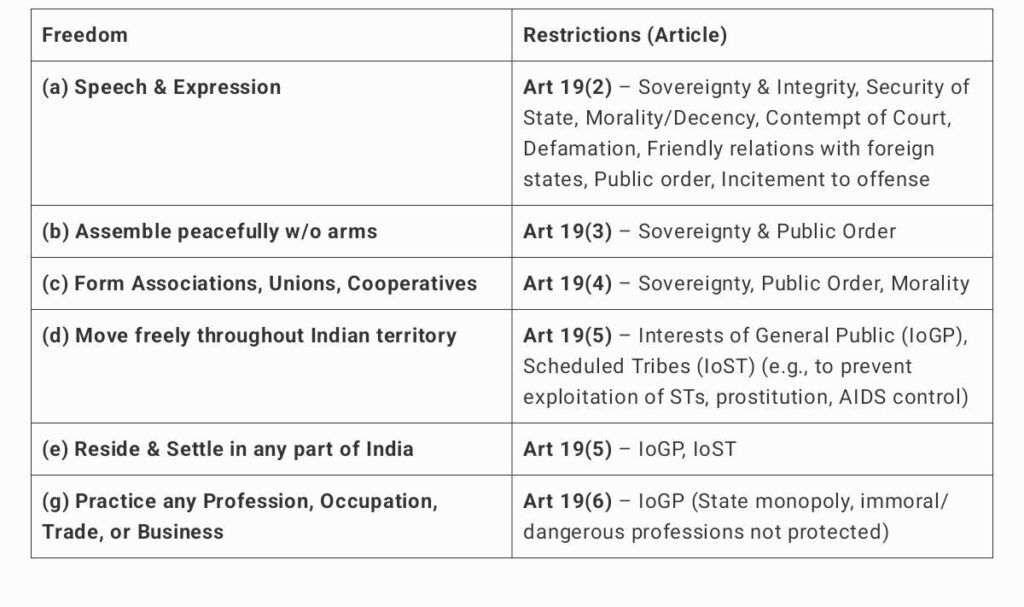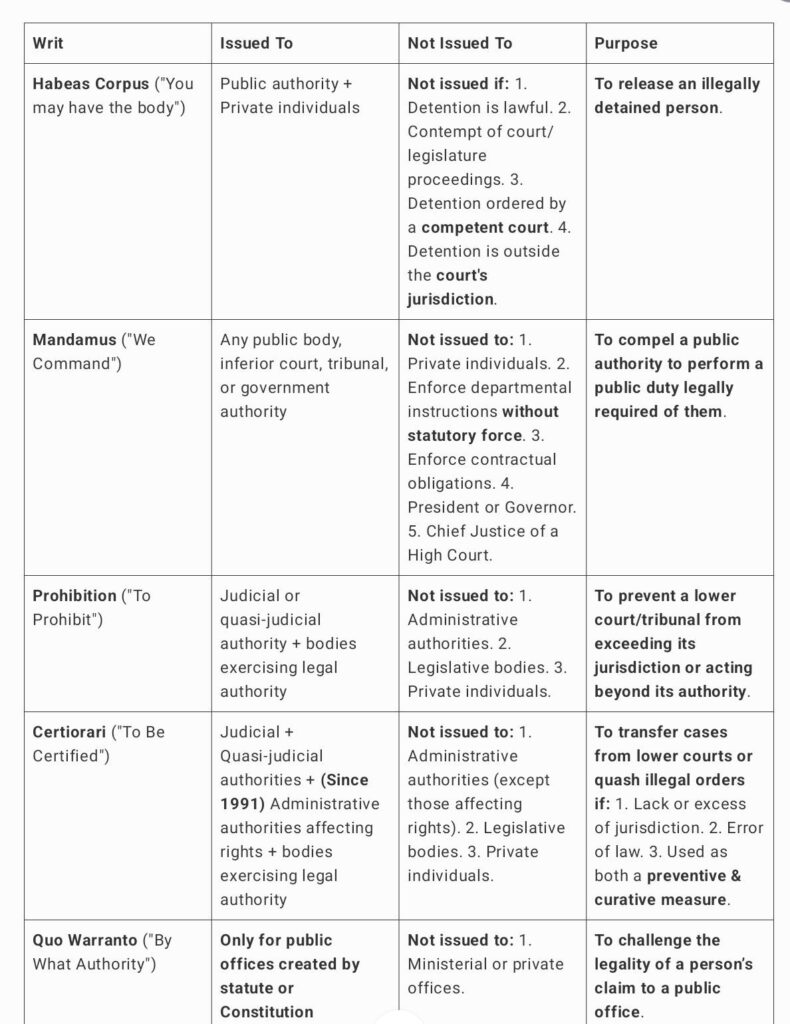Fundamental Rights
Philosophy of the Constitution – Fundamental Rights (FR) + Directive Principles of State Policy (DPSP) + Preamble
- Balances parliamentary sovereignty and judicial supremacy.
- Rights are enforceable against state actions but not against private individuals (legal remedy available).
Article 13
- Constitutional amendment under Article 368 is NOT a law (24th Amendment Act).
- Keshavananda Bharati case – SC ruled that amendments cannot violate the Basic Structure.
Definition of ‘State’ under Article 13 (as per SC):
- State is the chief funding source.
- Deep and pervasive state control.
- Performs an important public function closely related to government work.
- A government department transferred to a body.
- Monopoly status protected by the state.
Applicability of Fundamental Rights
- Only for citizens: Articles 15, 16, 19, 29, 30.
- Applicable against individuals: Articles 15(2), 17, 23, 24.
Article 16 – Equality in Public Employment
- No discrimination in state employment based on religion, race, caste, sex, place of birth, descent, or residence.
- Key Amendments:
- 77th AA (1995) – Reservation in promotions.
- 81st AA (2000) – Ended 50% ceiling on backlog vacancies.
- 85th AA (2001) – Allowed consequential seniority.
Article 14 – Equality Before Law & Equal Protection of Laws
Equality Before Law:
- No special privileges for anyone.
- Equal subjection to ordinary law.
- No one is above the law.
Equal Protection of Laws:
- Equal treatment in similar circumstances.
- Similar application of laws to similarly placed individuals.
- Like should be treated alike without discrimination.
Article 18 – Abolition of Titles
- Prohibits Indian citizens from accepting titles from foreign states.
- Balaji Raghavan vs UoI (1996) – SC upheld validity of National Awards (not hereditary titles, cannot be used as prefixes/suffixes).
Article 19 – Six Freedoms (Only Against State, Not for Foreigners/Legal Entities)

Article 19 – Six Freedoms (Only Against State, Not for Foreigners/Legal Entities)
- Article 19(a) – Freedom of Speech & Expression
- Includes the right to propagate one’s own views and the views of others.
- Covers Right to Information (RTI), Right Not to Listen, and Right to Remain Silent.
- Article 19(b) – Right to Assemble Peacefully Without Arms
- Section 144 CrPC – Magistrate can restrict assembly if it risks:
- Obstruction, danger to life, health, safety, public tranquility, or riot.
- Section 141 IPC – Unlawful assembly (5+ persons) if they:
- Forcefully occupy property.
- Commit mischief.
- Resist execution of any law.
- Section 144 CrPC – Magistrate can restrict assembly if it risks:
- Article 19(d) – Freedom of Movement
- Covers only internal migration (external migration covered under Article 21).
- Article 19(g) – Right to Occupation, Trade, and Business
- Covers all means of livelihood, except:
- State monopoly.
- Immoral or dangerous professions.
- Covers all means of livelihood, except:
- 44th Amendment Act – Abolished Right to Property (Article 31) (done by Janata Government, not Indira Gandhi).
Article 20 – Protection in Convictions
- No Ex-Post-Facto Law (Punishment cannot be imposed retrospectively)
- Applies only to criminal laws, not civil laws.
- Applies only to conviction, not trial.
- Does not provide immunity in preventive detention cases.
- No Double Jeopardy (Cannot be prosecuted + punished twice for the same offense)
- Applies only to judicial courts/tribunals, not departmental or administrative actions.
- No Self-Incrimination
- Exceptions:
- Applies only to criminal cases, not civil cases.
- Compulsory production of material objects allowed.
- Thumb impressions, specimen signatures, and blood samples can be collected.
- Compulsory exhibition of body is allowed.
- Exceptions:
Article 22 – Protection Against Arbitrary Arrest & Detention
Part 1: Rights in Ordinary Arrests
- Rights include:
- Being informed of grounds of arrest.
- Right to consult and be defended by a legal practitioner.
- Must be produced before a magistrate within 24 hours.
- Release mandatory if not produced before a magistrate within 24 hours.
- Exceptions:
- Does not apply to:
- Arrests under court orders.
- Civil arrests.
- Non-payment of income tax.
- Deportation of aliens.
- Not applicable to enemy aliens or preventive detention cases.
- Does not apply to:
Part 2: Preventive Detention Laws
- Applies to both citizens and non-citizens.
- Grounds of detention can be kept confidential (if in the public interest).
- Detention beyond 3 months requires approval from a committee of 3 High Court-qualified judges.
- Parliament can extend detention beyond 3 months without approval of an advisory board in certain cases.
- Deepak Bajaj vs SoMHA – SC upheld Habeas Corpus as a great privilege, even in preventive detention cases.
Legislative Authority on Preventive Detention:
Article 23 – Prohibition of Forced Labor & Human Trafficking
- Surjit Roy vs SoRJ (1983) – Prisoners must be paid fair wages for their work.
- Exceptions:
- State-imposed compulsory service for public purposes is allowed.
- However, state cannot discriminate based on religion, race, caste, or class.
Article 24 – Prohibition of Child Labor
- Child Labour (Prohibition and Regulation) Act, 1986 – Prohibited child employment in certain occupations.
- Amendment (2016) → Renamed as Child & Adolescent Labour (Prohibition and Regulation) Act, 1986:
- Completely prohibits employment of children (below 14 years) in all occupations.
- Prohibits employment of adolescents (14–18 years) in hazardous occupations.
Religious Freedoms (Articles 25-28)
Article 25 – Freedom of Religion
- Covers both beliefs and religious rituals.
- Restrictions:
- Public order, morality, and health.
- Article 25(2)(a) – State can regulate secular activities of religious practices.
- Article 25(2)(b) – Hindu religious institutions must be open to all sections of Hindus.
Article 26 – Rights of Religious Groups
- Establish & maintain institutions for religious & charitable purposes.
- Manage their own religious affairs.
- Own & acquire movable and immovable property.
- Administer property according to law.
Article 27 – Freedom from Taxation for Religion
- State cannot impose taxes to promote any particular religion.
- Taxation for maintaining all religions is allowed.
- Prohibits only taxes, not fees.
Cultural & Educational Rights (Articles 29-30)
Article 29 – Protection of Cultural & Educational Rights
- Any section of citizens with a distinct language, script, or culture has the right to conserve it.
- No citizen can be denied admission to state-funded or aided institutions based on religion, race, caste, or language.
- SC interpretation: Not restricted to minorities, as “sections of citizens” includes all communities.
Article 30 – Rights of Minorities to Establish & Administer Institutions
- Only applicable to religious & linguistic minorities.
- State cannot discriminate while granting aid to minority institutions.
Article 32 – Right to Constitutional Remedies
- Right to move directly to the Supreme Court if fundamental rights are violated.
- Suspension of Article 32:
- Can only be done by the Constitution, not Parliament.
- During a National Emergency (Article 359), the President can suspend enforcement of Fundamental Rights.
- Violation of Fundamental Rights is a prerequisite for invoking Article 32:
- It cannot be used to determine the constitutionality of laws unless they directly infringe fundamental rights.
Writs Under Article 32 & Article 226

Writs Against Private Individuals
- Only Habeas Corpus can be issued against private individuals.
Article 33: Restriction or Abrogation of Fundamental Rights for Armed Forces
- Only Parliament has the power to restrict or abrogate Fundamental Rights of armed forces and related personnel.
- “Members of armed forces” include non-combatants.
- Parliament can exclude court-martial proceedings from writ jurisdiction through law.
Article 34: Martial Law and Indemnity Clause
- Acts of indemnity (protection to government servants for actions during martial law) cannot be challenged in court on Fundamental Rights grounds.
- Martial law suspends both the government and ordinary law courts.
- Supreme Court: Declaration of martial law does not automatically suspend Habeas Corpus.
Article 35: Power of Parliament to Make Laws on Certain Fundamental Rights
- Parliament has exclusive power to make laws for enforcing certain Fundamental Rights, including some matters falling within the State List.
Right to Property (Post 44th CAA, 1978)
- Now a legal right, not a Fundamental Right.
- Protection only against executive action, not against legislative action.
- No guaranteed right to compensation.
- Two exceptions where compensation is applicable:
- Article 30: Minority educational institutions (44th CAA, 1978).
- Article 31A: Land under personal cultivation within statutory ceiling limits (17th CAA, 1964).
Exceptions to Fundamental Rights
Article 31A:
- Five categories of laws are immune from Articles 14 and 19.
- However, State laws are not immune unless they receive the President’s assent.
Article 31B:
- Any law placed in the 9th Schedule is immunized from challenge.
- Wider than Article 31A since it applies to all laws, not just specific categories.
- I.R. Coelho Case (2007):
- Laws placed in the 9th Schedule after April 24, 1973, can be challenged if they violate Articles 14, 15, 19, or 21.
Article 31C (25th CAA, 1971):
- Laws implementing Directive Principles under Article 39(b) & (c) cannot be declared void even if they violate Articles 14 and 19.